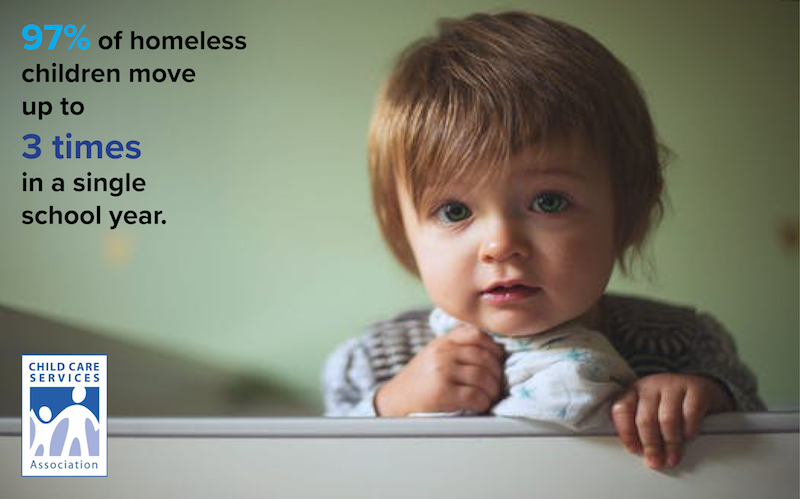FOR IMMEDIATE RELEASE
MEDIA CONTACT
Savion Thorne
919-967-3727
saviont@childcareservices.org
Child Care Services Association (CCSA) releases Families with Children Experiencing Homelessness, FY2019-FY2021 Child Care and Development Fund (CCDF) State Plans outlining efforts in all 50 states
Chapel Hill, N.C., January 15, 2020: Child Care Services Association (CCSA) works to ensure every child has the best start in life with high-quality child care, but that best start is hindered when families with children experience homelessness. In 2019, according to the North Carolina Coalition to End Homelessness, 9,314 people experienced homelessness on any given night in North Carolina, and 31% of those people were in families with children. Advocates state that this number is likely higher as it is difficult to fully quantify. CCSA has released the Child Care and Development Fund (CCDF) State Plans for 2019-2021 “Families with Children Experiencing Homelessness” on its website, with North Carolina’s plans to combat homelessness in families with children outlined on pages 58-60.
“North Carolina’s efforts to combat early childhood homelessness are important steps toward the goal of having all children ready to succeed in school and life,” said CCSA President Marsha Basloe. “Secure housing is a critical component for a child’s healthy growth and development, as is access to high-quality child care for these vulnerable children. Through this work at the state and local level, in North Carolina and across the country, more young children will have the opportunity to participate in enriching early learning programs and have continuity of care, possibly the only continuity they will have each day. ”
The NC Yay Babies Homelessness Initiative focuses to increase early intervention and early education services delivered to children birth to 5 years old that are experiencing homelessness. DCDEE increased access to high-quality child care for homeless families. Subsidy funding now includes a 4% set aside to serve vulnerable populations which includes children identified as having special needs and children and families experiencing homelessness or those who are in a temporary living situation. Counties must establish a separate waiting list for children and families who are in one of these vulnerable populations.
To see North Carolina’s complete plan to fight early childhood homelessness, view the report here.
Families with jobs and secure housing can find child care through the Child Care Resource & Referral network, friends and family and the internet. However, families with children experiencing homelessness find that search more difficult. Child Care Resource & Referral agencies provide outreach to support families and children. Finding child care offers two important benefits—the ability to participate in job training, education, and other programs essential to resolving their homelessness and the opportunity to have a safe setting for children to grow.
Volumes of research connect a young child’s early experiences with the development of his or her brain structure. According to the Center on the Developing Child at Harvard University, the early years of life—when more than 1 million new neural connections form every second—provides a foundation for all future learning, behavior and health. Homelessness jeopardizes the health, early childhood development and educational well-being of infants, toddlers and preschool-aged children and creates unique barriers to participating in early care and education. Since nearly 50 percent of children currently living in federally-funded homeless shelters are under the age of 5, this is a problem for families, communities, states and the country.
The 2019-2021 CCDF State Plans show how different states have embraced the CCDF law and regulation with regard to serving families experiencing homelessness, making changes to policies and practice, including eligibility requirements, coordinating with partners, increasing access and providing professional development for those in the child care field to increase access to child care and ensure families with children experiencing homelessness receive the support and services they need.
CCSA provides further resources for child care professionals, community members and families to learn more and combat early childhood homelessness here. Many children experiencing homelessness also experience food insecurity. There is a need for better data on food insecurity among children birth to 5 in the Triangle as well as an understanding of the causes and effects of food insecurity on early learners. CCSA has released a report outlining the concept and realities of food insecurity and the findings and methodology of mapping food insecurity in the Triangle. You can find the report and more here.
Child Care Services Association
Founded in 1974, Child Care Services Association’s mission is to ensure affordable, accessible, high-quality child care for all young children and their families. Using a holistic approach, CCSA supports children and families, helps child care professionals improve the quality of early education children receive and ensures all families can afford and access the high-quality early care and education that is so important for a child’s early development. Through its Meal Services Program, CCSA also provides nutritious meals to children at child care centers, where they may eat 50-100 percent of their meals. Our T.E.A.C.H. Early Childhood®, Child Care WAGE$® and Infant-Toddler Educator AWARD$ Plus programs give child care professionals the means to obtain an education and supplement their salary based on that education. CCSA also licenses T.E.A.C.H. and WAGE$ across the U.S. and conducts early childhood systems research and policy development statewide and nationally. For more information, visit www.childcareservices.org.
-end-




